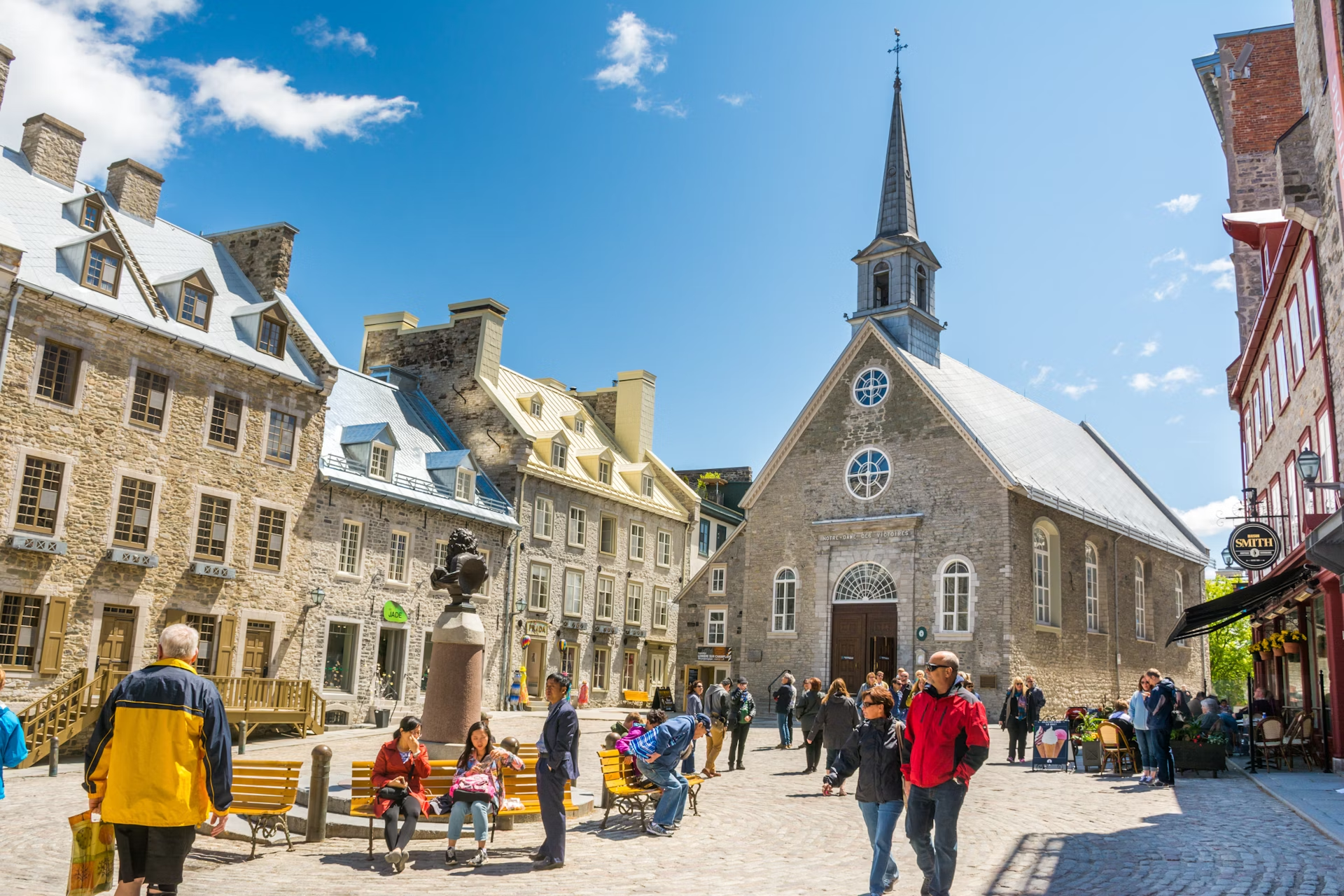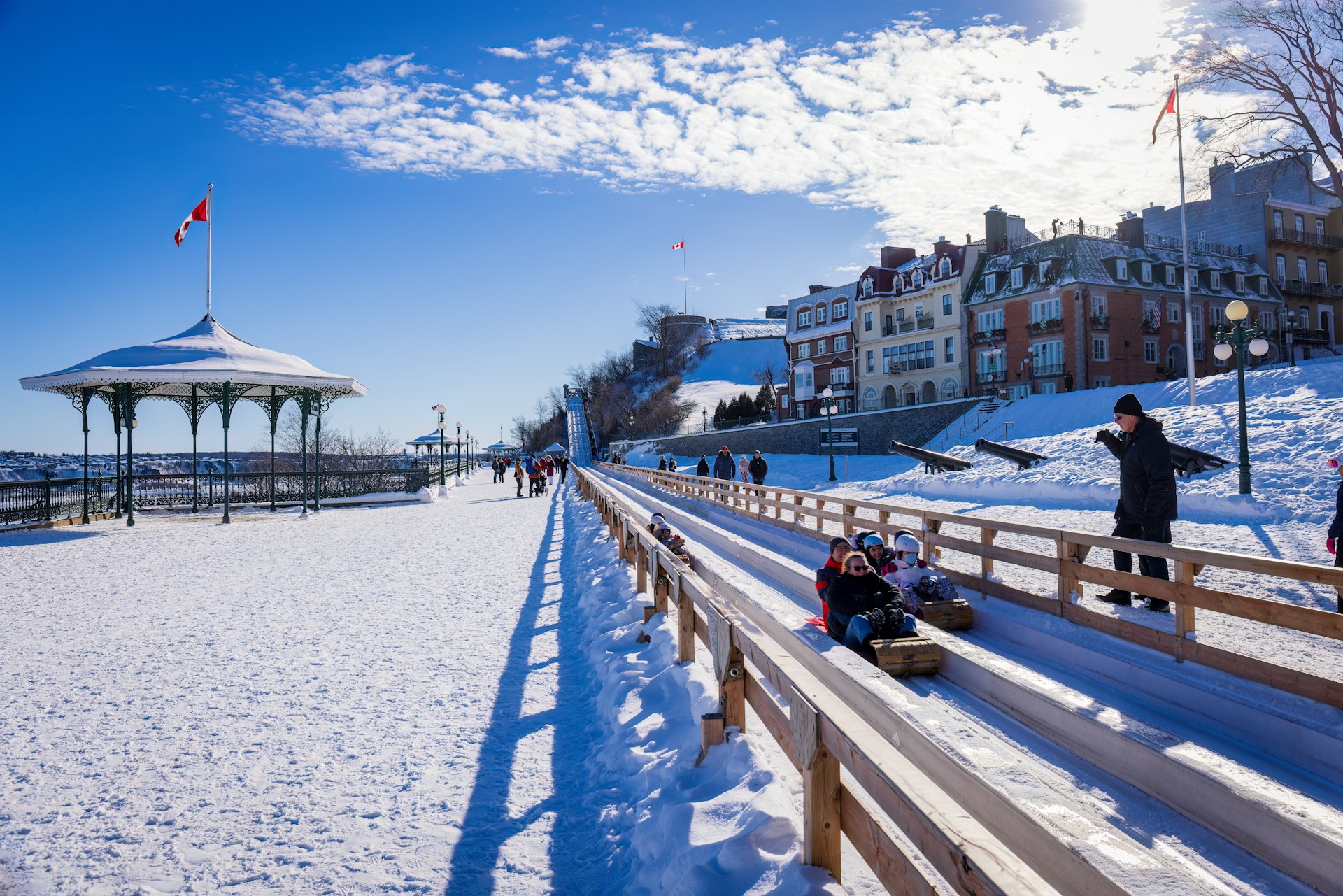When I first visited Québec City in 2013, I fell in love.
After a couple of short getaways here, the city lured me in with its European-style architecture, French-speaking locals and laid-back vibe – so I rented my first apartment in 2014. As an anglophone who does not speak French well, Québec City, while a part of Canada, felt foreign to me. In other words, it was an ideal destination for a full-time traveler who was unsure about living in Canada again.
It is not just the architecture and language that make Québec feel different. Québecois use the 24-hour clock, while the rest of the country uses 12. When looking at prices, they often use a comma instead of a period to separate dollars and cents. Québec swear words are religiously based, and if you hear someone say “tabarnak!” they are dropping the f-bomb.
Intrigued yet? Read on to learn more essential tips and information as you plan your visit to Québec City.
Is Québec City better than Montréal?
Naturellement! But seriously…Québec City and Montréal are very different cities, ones that complement each other nicely. Where the latter is edgy and cosmopolitan, the former is relaxed and comforting. Both cities have a thriving food scene, and a love for the outdoors. And they’re only three hours apart by train.

Always book accommodations during major festivals at least six months in advance
Finding accommodations in Québec City is generally easy, but if you’re planning to visit during one of the popular festivals (Festival d’été de Québec in summer and Carnaval de Québec in winter) or during the Christmas break, book at least six months in advance. The longer you wait, the more expensive the rooms will be – and sometimes every room in and near Vieux Québec gets completely booked, making last-minute trips during these peak periods a challenge.
Plan on spending at least three days in Québec City
There is a lot to see and experience here, and I’d recommend spending at least three days. Explore Vieux Québec on the first day, then branch out to such other neighborhoods as St-Roch and Montcalm on the second day. On the third day, consider a day trip to Île d’Orléans or Wendake.
The cheapest transportation from the airport is also the slowest
For many years, the only way to travel from the airport to downtown Québec City was by taxi, at a price of CA$35. Thankfully, a cheaper bus service is now available, at CA$7 (US$5.20) per ticket. Two bus lines, 76 and 80, travel to the airport; take the line 80 and transfer to line 1 at Gare Fluviale to get to downtown Québec City.

Navigating parking in Québec City can be tricky
In Vieux Québec, metered street parking can be found on a handful of streets, but spots are in high demand. Though there will be a machine nearby to pay for the space, save yourself time and download the Copilote app on your phone: after you’ve added your credit card, you can pay for parking by entering the four-digit number on the blue tag by your space. Street parking spaces are usually available for two to five hours; note that overnight street parking is free from 9pm to 9am, and until 10am on Sundays. Make sure you verify local rules before leaving your car overnight.
There are a couple of parking garages located in or close to Vieux Québec. The one underneath Hôtel de Ville (City Hall) is quite small, with a large parking garage on rue Dauphine, near the traffic lights. In Old Lower Town, near the marina and along the St Lawrence River, there are quite a few parking lots, as well as a parking garage.
Here’s the trick to understanding short-term apartment rental descriptions
Apartment ads were my first hurdle to life in Québec City, and descriptions touting “1½ ,” “2½,” “3½,” “4½” and “5½” apartments confounded me. Eventually, I learned that the numbers indicate the number of total rooms, while the “½” means bathroom (even if there’s more than one). My first apartment was a 1½, which could best be described as a postage stamp with a bathroom. This number system is often used for short-term rentals as well, with the most common being a 3½ (one bedroom, plus kitchen, living room and bathroom).
You can find 4½ (two-bedroom) and 5½ (three-bedroom) rentals as well – though I’d recommend always reading the rental descriptions carefully, as landlords don’t change the size indication of an apartment even if they have renovated and decreased the number of bedrooms. For instance, an apartment can be a 5½ in size, but have only two bedrooms. Though this doesn’t happen often, do your research to avoid disappointment.

Est-ce que tu parles français?
Many assume that to enjoy Québec City you have to speak French – and that Québecois will treat you poorly if you don’t. Happily, this stereotype no longer applies (mostly!). I say this as an anglophone who is still struggling with the French language after years of living here full time.
When I first visited in 2013, finding locals who spoke some English, even in touristy Vieux Québec, was a challenge. Today, most businesses in the old city only hire staff who can also speak passable English. Nonetheless, I’d advise making an effort to greet everyone in French; locals will generally switch over if they speak English – even if some do not. This little courtesy will go a long way.
Be mindful on St-Jean-Baptiste Day
St-Jean-Baptiste Day on June 24 is the biggest holiday celebration for Québecois, a day for embracing the love and pride they have for their language, history, traditions and culture. It can be a fun day, but if you are non-French-speaking anglophone, use caution, as some unfriendly types may snap at you if you are not speaking French during the festivities. If you want to experience the celebrations, ask hotel or hostel staff for recommendations – and heed their advice.
Canada Day is moving day in Québec
While tourists celebrate Canada Day on July 1 in Vieux Québec, locals are busy moving. Most leases run out June 30 in Québec, so while you’re busy exploring, you may well see someone carrying a sofa through the crowd to their new place.

Vieux Québec is not very accessible
For able-bodied people, Québec City is very walkable and easy to enjoy. Unfortunately, Vieux Québec’s narrow, cobbled streets, many at steep inclines, make exploring the area a challenge for those who use a wheelchair. Note that the popular funicular that connects Terrasse Dufferin in Vieux Québec with Petit-Champlain in Old Lower Town is fully accessible.
If you’re injured in Québec City, what should you do?
Jeffery Hale – St Brigid’s hospital caters to English-speaking patients – though it is the Ste-Foy neighborhood, outside of the center of town, and not open 24/7. If you need immediate urgent care while you’re in Vieux Québec, the closest hospital is Hôtel Dieu. As someone who dislocated their shoulder and struggled though five hours in the ER, I would strongly recommend downloading a translation app prior to arriving to make communication with staff easier. Note that I did find most doctors spoke some English.
While you may be able to communicate in English with medical staff, all medical paperwork will be in French. Also, upon arrival at the hospital you will be asked for insurance documentation, a credit card – or both. If you are a resident of Ontario and have OHIP, you will not need to pay in advance.












